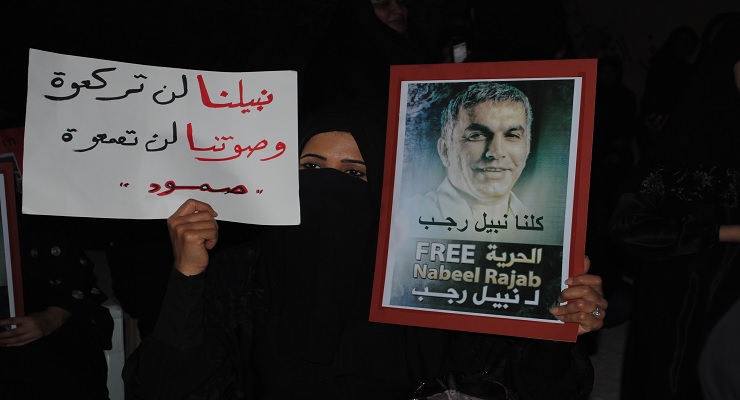
From Human Right Watch
(Beirut) – The Bahrain Court of Cassation, the country’s court of last resort, on December 31, 2018 upheld a five-year sentence for Nabeel Rajab, a prominent human rights defender, Human Rights Watch said today.
The sentence arose from comments criticizing torture in a Bahrain prison and the Saudi-led military campaign in Yemen. Rajab has already served two-years on other charges related to peaceful expression. The date of the hearing, scheduled for New Year’s Eve, raised concerns that the authorities intended to uphold Rajab’s conviction at a moment when it would attract minimal media scrutiny.
“Nabeel Rajab’s conviction for his refusal to stay silent on the government’s rights abuses is further proof of the Bahrain authorities’ flagrant disregard for human rights,” said Lama Fakih, deputy Middle East director at Human Rights Watch. “Nabeel Rajab should not have been arrested in the first place, and upholding his sentence is a grave miscarriage of justice.”
Rajab is one of dozens of human rights defenders, political activists, opposition leaders, and journalists unjustly imprisoned since the government quelled antigovernment protests in 2011. Rajab is the head of the Bahrain Center for Human Rights (BCHR), deputy secretary general of the International Federation of Human Rights (FIDH), and a member of the Human Rights Watch Middle East and North Africa Advisory Committee.
Authorities first arrested Rajab on April 2, 2015 because of his tweets alleging torture in Bahrain’s Jaw Prison. He was released provisionally on humanitarian grounds on July 13, 2015, but re-arrested on July 13, 2016, for criticizing the Bahraini authorities’ refusal to allow journalists and rights groups into the country. A court sentenced him in July 2017 to two years for this criticism, which the Court of Cassation upheld on January 15, 2018. Rajab completed this sentence in July.
On February 21, Bahrain’s criminal court sentenced Rajab to five years in prison for tweeting in 2015 about torture in the Jaw Prison and criticizing the Saudi-led military campaign on Yemen. Public prosecution documents Human Rights Watch reviewed cite three criminal code provisions for the charges against him. The documents cite Article 133 for “deliberately disseminating in wartime false or malicious news, statements, or rumors […] so as to cause damage to military preparations.” They also cite Article 215 for “publicly offending a foreign country” and Article 216 for “insulting a statutory body.”
The Manama Appeals Court upheld Rajab’s five-year sentence on June 5. He appealed this decision on July 5.
Rajab’s conviction and sentence violates Bahrain’s obligations under international law.
On August 13, 2018, the United Nations Working Group on Arbitrary Detention (WGAD) published an opinion regarding the legality of Rajab’s detention. The WGAD concluded that the detention was not only arbitrary, as it resulted from his exercise of his right to free speech, but also discriminatory, based on his political opinions and status as a human rights defender. The WGAD therefore stated that Rajab’s detention violated the Universal Declaration on Human Rights, as well as the International Covenant on Civil and Political Rights (ICCPR), which Bahrain ratified in 2006. The WGAD requested the Bahraini government to “release Mr. Rajab immediately and accord him an enforceable right to compensation and other reparations, in accordance with international law.”
Rajab, who also spent eight months in pre-trial detention, appears at times to have been subjected to treatment that may amount to arbitrary punishment. He was held in solitary confinement for more than two weeks after his arrest in June 2016. His family said that Rajab is held in a cramped, dirty, and insect-infested cell at Jaw Prison, where he remains locked in his cell for 23 hours a day. During his detention, Rajab’s health deteriorated. He has had several surgical procedures, suffered heart palpitations that led to hospitalization, and developed other medical conditions, including a low white blood cell count, his family said. Bahrain should undertake a prompt, impartial, and independent investigation into his allegations of ill-treatment in detention.
“Bahrain has chosen to mark the new year by entrenching it attacks on human rights defenders and undermining free expression,” said Fakih. “But Bahrain cannot hide its abuses from public critique by jailing dissidents. Bahraini rights defenders are not backing down.”
Here is more on the case from Voice Of America:
A court in Bahrain upheld Monday a five-year prison sentence against prominent activist Nabeel Rajab over tweets alleging torture at one of the country’s prisons and criticism of the Saudi-led war in Yemen. Rajab’s son Adam Rajab and four human rights groups confirmed the ruling. Rights groups criticized it as a miscarriage of justice.
Bahrain’s Court of Cassation, its top judicial body, upheld the conviction on charges of “spreading false rumors in time of war,” “insulting public authorities” and “insulting a foreign country,” according to Amnesty International. The rights group described Nabeel Rajab as a “prisoner of conscience” who has already spent two years behind bars, including nine months in solitary confinement.
The Bahrain Institute for Rights and Democracy said Rajab’s sentencing was over re-tweets of critical comments made by others about alleged torture at prisons in Bahrain, and tweets he wrote condemning airstrikes in Yemen mounted by the Saudi-led coalition, of which Bahrain is a member.
Rajab is also serving a two-year sentence over television interviews he gave that included criticisms of Bahrain, a small island-nation off the Saudi coast that’s home to the U.S. Navy’s 5th Fleet. He’s been detained since June 2016 as part of a wide crackdown on dissent in Bahrain.
A major figure in Bahrain’s 2011 protests that saw tens of thousands from the country’s majority Shiites demand greater rights from the Sunni-led monarchy, he is also the co-founder and president of the Bahrain Centre for Human Rights and a founding director of the Gulf Center for Human Rights.
In the years since the 2011 protests, Bahrain has dismantled opposition groups, imprisoned activists and revoked citizenship of over 700 people. Amid the crackdown, local Shi’ite militant groups have carried out attacks on security forces.
Leave a Reply